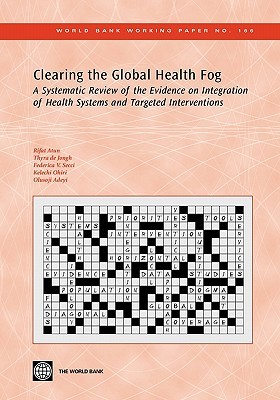
- We will send in 10–14 business days.
- Author: Rifat Atun
- Publisher: World Bank Publications
- ISBN-10: 082137818X
- ISBN-13: 9780821378182
- Format: 17.5 x 24.6 x 0.5 cm, minkšti viršeliai
- Language: English
- SAVE -10% with code: EXTRA
Reviews
Description
A longstanding debate on health system organization relates to the benefits of integrating programs that emphasize specific interventions into mainstream health systems to increase access and improve health outcomes. This debate has long been characterized by polarization of views and ideologies, with protagonists for and against integration arguing relative merits of each approach. Recently, the debate has been rekindled due to substantial rises in externally-funded programs for priority health, nutrition, and population (HNP) interventions and an increase in international efforts aimed at health system strengthening. However, all too frequently these arguments have not been based on hard evidence. In this book we present findings of a systematic review that explores a broad range of evidence on: (i) the extent and nature of integration of targeted health programs that emphasize specific interventions into critical health systems functions; (ii) how the integration or non-integration of health programs into critical health systems functions in different contexts have influenced program success; and (iii) how contextual factors have affected the extent to which these programs were integrated into critical health systems functions. The findings provide a new synthesis of evidence to inform the debate on health systems and targeted interventions. In practice a rich mix of solutions exists. While the discussion on the relative merits of integrating health interventions will no doubt continue, discussions should move away from the highly-reductionist approach that has polarized this debate.
EXTRA 10 % discount with code: EXTRA
The promotion ends in 21d.07:13:03
The discount code is valid when purchasing from 10 €. Discounts do not stack.
- Author: Rifat Atun
- Publisher: World Bank Publications
- ISBN-10: 082137818X
- ISBN-13: 9780821378182
- Format: 17.5 x 24.6 x 0.5 cm, minkšti viršeliai
- Language: English English
A longstanding debate on health system organization relates to the benefits of integrating programs that emphasize specific interventions into mainstream health systems to increase access and improve health outcomes. This debate has long been characterized by polarization of views and ideologies, with protagonists for and against integration arguing relative merits of each approach. Recently, the debate has been rekindled due to substantial rises in externally-funded programs for priority health, nutrition, and population (HNP) interventions and an increase in international efforts aimed at health system strengthening. However, all too frequently these arguments have not been based on hard evidence. In this book we present findings of a systematic review that explores a broad range of evidence on: (i) the extent and nature of integration of targeted health programs that emphasize specific interventions into critical health systems functions; (ii) how the integration or non-integration of health programs into critical health systems functions in different contexts have influenced program success; and (iii) how contextual factors have affected the extent to which these programs were integrated into critical health systems functions. The findings provide a new synthesis of evidence to inform the debate on health systems and targeted interventions. In practice a rich mix of solutions exists. While the discussion on the relative merits of integrating health interventions will no doubt continue, discussions should move away from the highly-reductionist approach that has polarized this debate.


Reviews